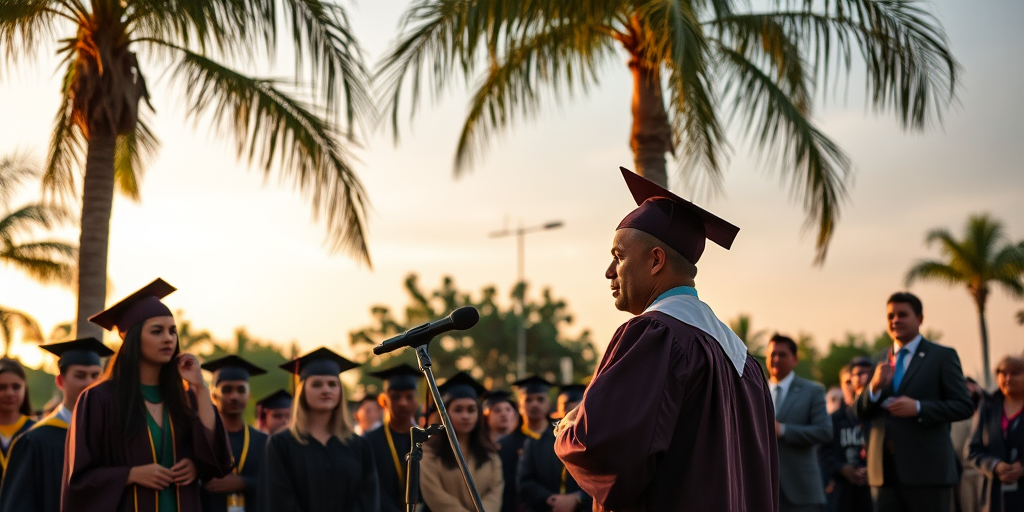Edcouch-Elsa Valedictorian Speech Interrupts Spotlight on Immigration
In what has become a viral sensation, a valedictorian’s speech from Edcouch-Elsa High School’s graduation ceremony was abruptly cut off as he raised issues around immigration, a topic deeply resonant within the Rio Grande Valley (RGV) community. While district officials cite technical difficulties, the incident has sparked a debate about censorship and the right to free speech in educational settings.
Graduation Ceremony Interrupted
The interruption occurred as Alfredo Campos, the valedictorian of Edcouch-Elsa High School, delivered a passionate speech to his fellow graduates on the urgent topic of immigration. “We know these people, and we know there is not a threat,” Campos was saying when his microphone went silent. Despite the technical glitch, Campos was handed another microphone to continue after a brief pause. However, the initial silence speaks volumes in the context of the challenges faced by undocumented families in the RGV.
Videos capturing the moment quickly went viral on social media platforms, amassing millions of views and sparking discussions across South Texas about the rights of students to address contentious social issues, especially those that impact their communities directly.
Official Response and Community Reactions
Responding to the public outcry, Edcouch-Elsa Independent School District released a statement attributing the microphone’s silence to technical issues with the sound system. “At no point did the District intentionally cut the microphone or attempt to censor the valedictorian’s remarks,” the statement clarified. They expressed regret over the incident and assured the community that they support students’ rights to express their views.
The controversy, however, did not end with the district’s explanation. Many Valley residents feel that the incident highlights broader issues of censorship and freedom of speech within educational institutions. Local community leader Maria Garcia proposed that the implications go beyond a simple technical failure. “In our community, immigration is not just a policy issue—it’s a matter of survival and identity,” she stated. “We need to allow our youth to speak on these pivotal issues without fear of being silenced.”
The Significance of the Message
Campos’s decision to use his valedictory speech to discuss immigration policies underscores the significance of the issue for the RGV, where many residents, including undocumented individuals, contribute to the region’s fabric. Campos intended his speech to not only express personal conviction but to offer support and guidance to those living in fear due to their immigration status. “I wanted to give people actionable steps so they could recognize their rights,” he mentioned, adding how community members frequently express concerns over potential deportations even during routine activities like going to work or shopping.
Such fears are not unfounded. The RGV, a bustling border region, often finds itself at the forefront of national immigration debates. This local dynamic makes Campos’s speech particularly impactful, as the young graduate drew attention to the human element often lost amidst political discussions.
Linking Past and Present
This isn’t the first time issues of immigration and censorship have made headlines in the RGV. Over the years, numerous incidents have spotlighted the tensions between policy and personal safety. The cutting of Campos’s microphone is reminiscent of previous protests and community movements challenging governmental and institutional actions that affect undocumented residents’ lives.
Jose Hernandez, a historian specializing in South Texas’ social movements, sees the incident as a continuation of the Valley’s rich history of activism. “The people of the RGV have a long tradition of standing up for their rights, and the youth are crucial in this ongoing narrative,” he noted.
Looking Ahead: Potential Implications
Moving forward, this incident may serve as a catalyst for broader discussions on how educational institutions handle controversial topics, especially in regions heavily affected by such issues. It might inspire other students in the Valley and beyond to voice their opinions, encouraging schools to develop frameworks that support free expression while maintaining educational integrity.
As for Edcouch-Elsa ISD, reassessing their technical systems and procedures for managing speeches could help prevent future misunderstandings. Establishing clear policies around freedom of speech and creating platforms for students to discuss social issues openly can foster a more inclusive educational environment.
Community Support and Resources
Community members interested in learning more about their rights or in participating in discussions about immigration and student free speech can attend local forums organized by various RGV advocacy groups. Additionally, the district intends to hold informational sessions to address any community concerns and demonstrate their commitment to transparency and student rights.
In conclusion, while a technical glitch momentarily silenced Alfredo Campos’s voice, it has inadvertently amplified broader conversations around immigration, free speech, and the role of educational institutions in shaping these dialogues in the Rio Grande Valley. As the community reflects on this incident, it becomes a reminder of the power of youth voices in effecting change and drawing attention to critical local impact issues.







